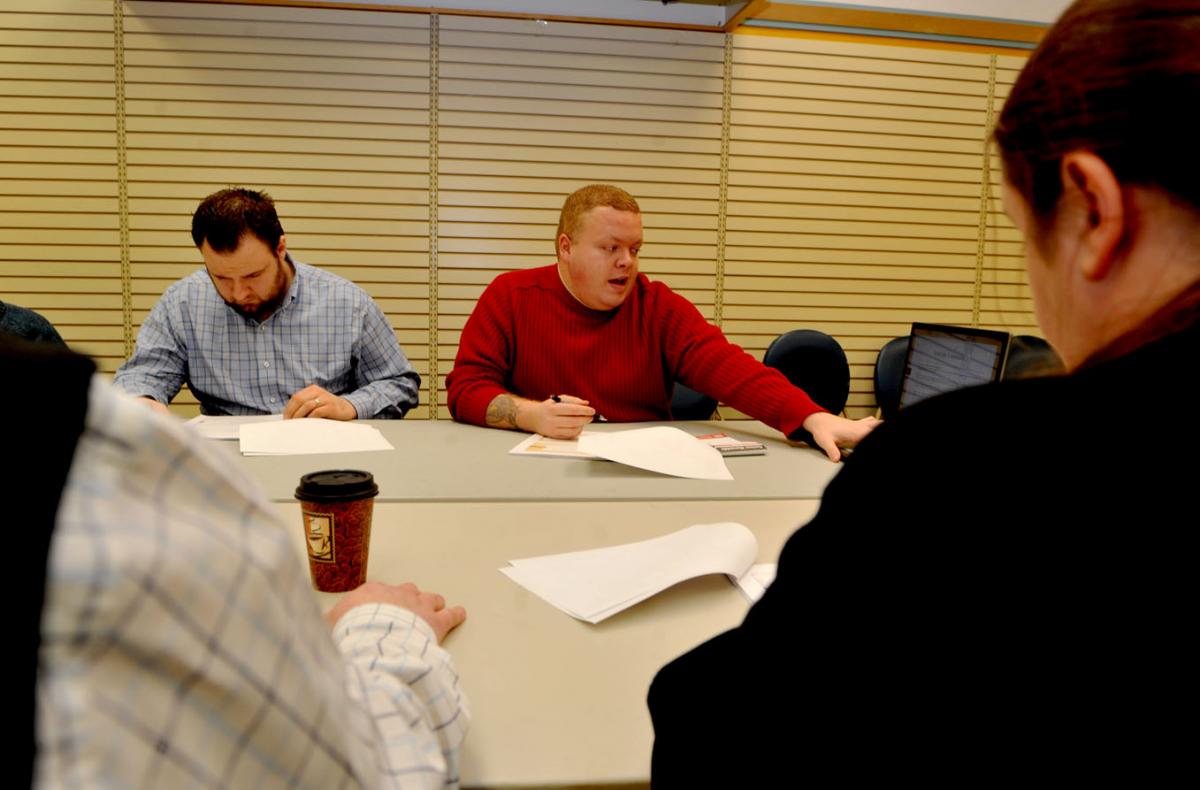
(Brockville councillor Leigh Bursey, right, explains the "Artscape" proposal for the former Trinity Anglican Church while Quinton Howes, left, assistant store manager at Home Depot in Brockville, listens during a meeting at the 1000 Islands Mall community room Friday afternoon.)
As evidenced by the most recent tone of its main supporter, Councillor Leigh Bursey, the latest effort to save the former Trinity Anglican Church from demolition is all but lost.
The “Artscape” proposal, while filled with intriguing possibilities, is yet another of those grand visions that inevitably hit the staggeringly high and unscaleable wall of financial impossibility.
Earlier Wednesday, the region's Joint Services Committee considered funding the plan as a public housing project, but there was little evidence of support.
Barring the sudden arrival of some benefactor with $394,000 to spare, local supporters of the arts and public housing will have to wait for some other time to test the synergistic potential of their plan.
And the Clarissa Street building, a house of worship deconsecrated and consigned to the ignoble fate of having its bells stolen and its fate sealed by red ink, now seems all but certain to meet its end with the wrecking ball.
It may be cold comfort for heritage enthusiasts, but at least we can let it go knowing we tried more than once to preserve it.
There was a time city officials were all but certain the building would be repurposed in a condominium boom sweeping the downtown area.
When this proved too good to be true, other attempts were made, including a brew pub proposal that never got far, either with neighbours or the market.
What remains is a casualty of the free market.
Still, as we let Trinity go, it's time to take stock and see what lessons we can learn from this experience.
Because it will be repeated, perhaps in the near future.
I recall a conversation last September with Lance Besharah, who helped lead an earlier arts-themed save-Trinity campaign, as he looked ahead to the next heritage church building crisis.
Given Brockville's demographics, he argued, other churches in the city may one day be slated for demolition.
Besharah suggested the support his group has received in this campaign might make its way to city hall, in the form of a strategy to save other church buildings.
“This belongs to our kids, too. That's our history and our heritage,” Besharah told me, adding we are in danger of losing that heritage to “plastic condominiums.”
Given the discouragingly slow pace of that as-yet-unseen condo boom, it could be some time before the Court House Green is framed by plastic towers.
Still, declines in church populations continue, so further deconsecrations may be around the corner. We may not get those plastic condos, but we could end up with empty lots.
Saving those future churches could prove as hard a sell as the Trinity proposals. After all, private dollars would be needed, as would city money.
Barring such sources of funding, the only other recourse could be legislative, in the form of restrictions on sale and/or demolition of buildings deemed too precious to our heritage to lose.
Did I mention the words “hard sell”? Besides, such rules already exist at the provincial level and they may not fit future situations.
Creative solutions might still save those buildings, however, and we are likelier to come up with such solutions if we start talking about the problem now.